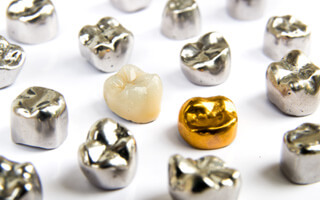Dental Crowns – Lakewood, Dallas, TX
Natural-Looking Repair for Damaged Smiles

You might think bone is the strongest material in the human body, but did you know that tooth enamel is even stronger than that? As durable as your teeth are, though, there are still plenty of ways that they can sustain damage over the years. Unfortunately, teeth cannot heal themselves when they become fractured or weakened like bones can. That’s where dental crowns come in! Dr. Travis Spillman and Dr. Jacquelyn Green can deliver natural-looking repair for damaged smiles with dental crowns in Lakewood, Dallas, TX. This solution can protect your pearly whites from further harm while also blending in with the rest of your smile. Contact Dental Center of Lakewood today to find out if a dental crown is right for you!
Why Choose Dental Center of Lakewood for Dental Crowns?
- Dentists with Decades of Experience Repairing Smiles
- Lifelike, Long-Lasting Materials Used
- Insurance Welcome & Affordable Dental Financing Options Available
What Is a Dental Crown?

Each tooth has two distinct parts: the section that you can see above the gums (also known as the crown of the tooth), and the roots hidden underneath. When a tooth’s crown becomes damaged, the tooth will only worsen over time, as enamel can’t regenerate after it has been lost. Fortunately, a custom dental crown can shield the tooth.
A dental crown is a cap designed to cover the entire crown of a tooth, safeguarding it against future issues. Crowns can be made from durable metals for back teeth, but for front teeth, we prefer tooth-colored materials like ceramic. These crowns are virtually just as durable as metal, but they appear more natural in your smile.
Your dentist in Lakewood, Dallas, TX may recommend a dental crown for a tooth that:
- Is severely cracked, chipped, or fractured.
- Has become too decayed for a filling alone to restore it.
- Is misshapen, short, or otherwise cosmetically imperfect.
- Has recently been treated with root canal therapy.
- Has been replaced by a single dental implant.
The Dental Crown Process

The process of getting a dental crown is a relatively quick one. In most cases, it only takes two appointments (after your consultation, where we determine whether you’re a good candidate for a crown). First, we remove a sliver of enamel from the tooth to ensure there is sufficient room for the crown. Then, we take impressions and fit you with a temporary crown while your real one is being created in a dental lab.
A few weeks later, you’ll return to our office to have your temporary switched out for your permanent crown. We’ll make sure that your bite feels comfortable and you’re satisfied with the results before bonding the crown to the tooth.
The Benefits of Dental Crowns

Dental crowns are actually one of the most popular dental treatments, and for good reason! They allow you to enjoy several benefits, including:
- Gorgeous, natural-looking results.
- Protection against damage that might otherwise cause a tooth to need an extraction.
- Restored ability to chew without discomfort.
- A relatively short treatment process.
- Results that can last for 10-15 years with minimal maintenance.
Understanding the Cost of Dental Crowns

Now that you know more about getting dental crowns at the Dental Center of Lakewood, it’s natural to wonder how much it’ll cost. You might not pay the same amount as someone else because the pricing can vary based on your unique circumstances. Once you’ve consulted with one of our dentists, we’ll walk you through a detailed estimate and get your approval before moving forward. In the meantime, continue reading below to learn about the different factors that impact your final invoice, and feel free to contact us for additional information.
Factors That Affect the Cost of Dental Crowns

There are a few things that can influence how much you’ll owe for your prosthetic, such as:
- The severity of your condition. If you have an overly decayed or broken tooth, you might require other procedures like a root canal before being fitted with a restoration. Any additional services come with associated fees.
- What they’re made from. The price can fluctuate depending on the material used, whether it’s porcelain, amalgam, gold, etc.
- How they’re created. Your dental crown may have a different rate if produced at a dental laboratory than if an in-office milling machine is used.
Remember that cheaper isn't always better when it comes to your teeth. You’ll want your artificial tooth to be made of quality materials to resist damage so it can last longer. With proper care, you can enjoy the many benefits of your investment for 10+ years.
Does Dental Insurance Cover Dental Crowns?

Most insurance policies have something in place for significant procedures like dental crowns. However, they don’t always cover 100% of the cost. You can usually expect about 50% of the total to be included if the restoration is deemed medically necessary. Every plan is different, so it’s worth checking the details to learn how much you’ll be personally responsible for.
If you can’t find the information you’re looking for and need assistance, please don’t hesitate to let us know! Our friendly office staff is familiar with different providers and can help you maximize your benefits.
Options for Making Dental Crowns Affordable

Not everyone has dental insurance, and we don’t want your budget to prevent you from getting the dental care you need to protect and preserve your teeth. As a result, we’ve partnered with CareCredit. If your application is approved, this third-party financer allows you to break down your total payment into more manageable installations. That way, you can safeguard your smile without breaking the bank!
Dental Crowns FAQs

Dental crowns in Lakewood can serve as an important part of your smile’s health and appearance. But since this procedure may cost a significant amount of money, it is understandable if you want to learn as much as possible about it before you commit to anything. To help you out, we have put together the following list of FAQs about crowns. If you do not see the answers to your specific questions, contact us directly so we can personally assist you.
What Are Dental Crowns Made Of?
Often, temporary crowns are constructed out of stainless steel. Their primary purpose is to protect a tooth while a permanent crown is being fabricated, so they are designed for cost-effectiveness and easy removal, rather than for aesthetics or top-tier function.
Permanent crowns can be made out of various materials, such as gold, silver, porcelain-fused-to-metal, or 100% porcelain. Here at the Dental Center of Lakewood, we tend to favor porcelain crowns because they are durable and biocompatible. They also offer remarkable aesthetics. In fact, they are so lifelike that onlookers are unlikely to notice that you have had some work done on your smile!
Are Dental Crowns Permanent?
We often refer to some dental crowns as “permanent,” but in the context of dental crowns, we are talking about a treatment that offers long-term results, rather than one that is technically permanent. Typically, crowns last for 5 – 15 years before they need to be replaced.
Also, keep in mind that while a crown does not last forever, it does require a permanent commitment on your part. After your tooth is prepared for its restoration, it will always need something to protect it.
How Do You Know When a Dental Crown Needs to Be Replaced?
Your dentist can determine with certainty whether a dental crown needs to be replaced. However, there are some signs that you can look out for that indicate a need to get your restoration checked out:
- A crown is visably damaged or discolored.
- The tooth beneath a crown is in pain.
- A crown is interfering with your bite, causing jaw pain and other forms of discomfort.
- A crown is unstable. It may feel loose or unsteady when you use it to chew sticky or tough foods.
- There is a dark line at the crown's base. With porcelain-fused-to-metal crowns, the outer layer of porcelain may begin to wear away, leaving a noticeable sliver of metal near the base of your tooth.
Does It Hurt to Get a Dental Crown?
During the crown preparation process, your tooth will be numbed, so you might feel a bit of pressure, but you should not experience any pain. After any anesthesia wears off, some mild soreness and increased sensitivity are to be expected.
Placing a permanent crown is typically a fast and comfortable process that does not require local anesthesia. Of course, if you have a sensitive mouth, there is no shame in asking your dentist in Lakewood to numb you.
